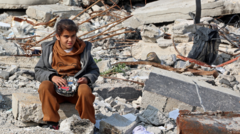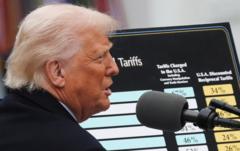The prospect of a Gaza hostage deal seems more likely as recent political shifts, external pressures, and changing on-ground situations prompt renewed negotiations. The outcome remains uncertain, but all parties involved face substantial challenges and expectations.
Fresh Hope for Gaza Hostage Deal Amidst Political Shifts

Fresh Hope for Gaza Hostage Deal Amidst Political Shifts
As discussions for a ceasefire and hostage release between Israel and Hamas gain traction, political dynamics, pressure on leaders, and regional factors play crucial roles.
The outline of a ceasefire and hostage release deal between Israel and Hamas has been on the negotiation table since May, but recent developments have galvanized efforts to advance this long-stalled agreement. One notable shift in this dynamic is the impending inauguration of Donald Trump as the next U.S. President. Trump's strong rhetoric, including a warning that "all hell" could break loose if hostages are not released before he assumes office, may influence Hamas's calculations. The group could interpret Trump's ascendance as a signal that the Biden administration's attempts to moderate Israeli policies may dissipate, raising concerns for an area already devastated by extensive conflict.
In parallel, Israeli Prime Minister Benjamin Netanyahu faces mounting pressure. While Trump's presidency might present him an opportunity to rally support for a deal among his right-wing coalition, opposition from hawkish factions persists. Notably, far-right Finance Minister Bezalel Smotrich has publicly decried the deal as detrimental to Israeli national security, while simultaneously recognizing the opportunity to solidify authority over the West Bank amid Trump's return to power.
Amidst these political currents, another significant factor emerges: pressure from within the Israeli military establishment. Key military leaders are reportedly challenging Netanyahu's continued military operations in Gaza, questioning their effectiveness following the elimination of key Hamas figures and rising Israeli casualties. The recent death of ten Israeli soldiers has intensified scrutiny on the costs of warfare and the feasibility of Netanyahu's promise of a "total victory" over Hamas, prompting calls for a strategic reevaluation.
Regional dynamics also play a critical role in the evolving conversation around the hostage deal. The relative weakening of Hamas's allies, notably Iran's Axis of Resistance, and the consequences of military setbacks for Hamas itself, suggest potential vulnerabilities that could incentivize the group towards negotiation.
Yet, substantial hurdles remain. The core divergences in priorities between Hamas, seeking a halt to hostilities, and Israel, keen on maintaining some military leverage, remain unresolved. The structure of the proposed deal, initially outlined by President Joe Biden as a phased approach to establish a permanent ceasefire, raises questions about the potential for mutual assurances and territorial management.
While renewed diplomatic efforts in Doha—bolstered by the attendance of high-level Israeli security officials—hint at a Western-backed reopening of dialogue, the complexities of achieving a long-lasting agreement endure. The possibility of progress in these negotiations springs from a combination of internal pressures, external influences, and the evolving landscape of regional politics, setting the stage for what could be a historic shift in the Gaza conflict narrative.























